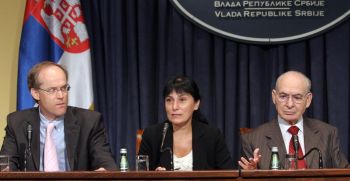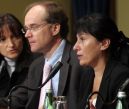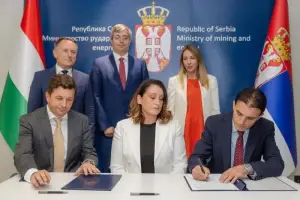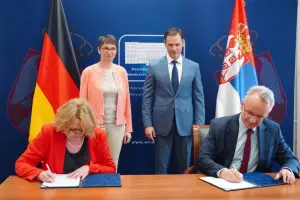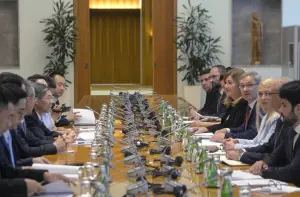Q:
A:
Negotiations with IMF concluded successfully
Belgrade,
1 September 2010
Minister of Finance Diana Dragutinovic stated today that talks on the fifth revision of the current standby arrangement between Serbia and the IMF were successful and that salaries and pensions will be increased at three points next year.
Addressing a press conference, Dragutinovic stressed that an agreement was reached with IMF representatives concerning the dynamics of increases in salaries and pensions next year, adding that the fiscal responsibility bill was also finalised.
The salary and pension freeze will remain in place this year. In 2011 salaries and pensions will be adjusted three times. The first adjustment will be in January, when they will be adjusted for six monthly inflation, or by a bit less than 3%, she explained.
In April salaries and pensions will be adjusted for three monthly inflation and half of GDP growth and in October for six monthly inflation, underlined Dragutinovic.
In 2010 the budget deficit will not be over 4.8% of GDP and in 2011 not more than 4% of GDP, noted Dragutinovic.
Dragutinovic pointed out that the fiscal responsibility bill has been completely harmonised, explaining that it combines two rules, rules regarding deficit and rules concerning public debt.
By implementing and respecting fiscal rules it will become possible to achieve macroeconomic stability, regardless whether Serbia does or does not have an arrangement with the IMF, she observed.
Deputy Prime Minister Jovan Krkobabic announced that it was agreed with the IMF that pensioners with a pension of RSD 20,500 or less will receive RSD 5,000 in one-off assistance.
Payment of the assistance will start by 15 October at the latest. The possibility of setting aside funds for helping pensioners with pensions up to RSD 30,000 is also under consideration, he highlighted.
Talks with the IMF about the fifth revision of the standby arrangement were complicated because the economic situation does not allow doing more than what was agreed upon, he remarked.
The pension reform and the Law on the pension and disability insurance fund received a positive assessment. It was concluded that the reforms have helped Serbia make far more progress in this respect than other countries in the region, asserted Krkobabic.
Governor of the National Bank of Serbia (NBS) Dejan Soskic stressed that the IMF has given a positive assessment of the monetary policy used in the recent period.
One of the positive steps taken by the NBS was increasing reference interest rates which stabilised prices, highlighted Soskic, adding that inflation is within predicted parameters, which is 6% with a variation rate of 2% annually.
In the upcoming period Serbia must continue to implement a responsible fiscal policy. More efforts will be made to use the national currency in financial transactions in the Serbian market, he underlined.
The Governor maintained that the depreciation of the exchange rate has made the economy more competitive and reduced spending, which is a good signal for those in Serbia who wish to produce and invest.
Head of the IMF mission to Serbia Albert Jaeger announced that the IMF executive board is expected to approve the fifth revision of the arrangement with Serbia on 27 September.
Jaeger emphasised that the condition for the approval of the fifth revision of the arrangement with Serbia is that the Serbian government submits the fiscal responsibility bill to the parliament, which will limit the budget deficit in 2011 to 4% of GDP.
If the revision is approved, Serbia will be able to draw €380 million to strengthen foreign currency reserves, he underlined.
When making a decision about lifting the salary and pension freeze it was necessary to find a balance between Serbia’s high budget deficit and the fact that salaries and pensions make up a big part of expenditure from the budget, and also the fact that food prices have gone up since the time when the freeze was put in place, Jaeger explained.
Speaking about the 2010 budget revision, Jaeger outlined that the main way to cover expenses will be the redistribution of funds as additional revenues stand at only RSD 2 billion.
The IMF still predicts that Serbia’s economic growth in 2010 will stand at 1.5%, adding that during recession there was a huge fall in employment levels in Serbia, a trend which could continue into next year, concluded Jaeger.
The salary and pension freeze will remain in place this year. In 2011 salaries and pensions will be adjusted three times. The first adjustment will be in January, when they will be adjusted for six monthly inflation, or by a bit less than 3%, she explained.
In April salaries and pensions will be adjusted for three monthly inflation and half of GDP growth and in October for six monthly inflation, underlined Dragutinovic.
In 2010 the budget deficit will not be over 4.8% of GDP and in 2011 not more than 4% of GDP, noted Dragutinovic.
Dragutinovic pointed out that the fiscal responsibility bill has been completely harmonised, explaining that it combines two rules, rules regarding deficit and rules concerning public debt.
By implementing and respecting fiscal rules it will become possible to achieve macroeconomic stability, regardless whether Serbia does or does not have an arrangement with the IMF, she observed.
Deputy Prime Minister Jovan Krkobabic announced that it was agreed with the IMF that pensioners with a pension of RSD 20,500 or less will receive RSD 5,000 in one-off assistance.
Payment of the assistance will start by 15 October at the latest. The possibility of setting aside funds for helping pensioners with pensions up to RSD 30,000 is also under consideration, he highlighted.
Talks with the IMF about the fifth revision of the standby arrangement were complicated because the economic situation does not allow doing more than what was agreed upon, he remarked.
The pension reform and the Law on the pension and disability insurance fund received a positive assessment. It was concluded that the reforms have helped Serbia make far more progress in this respect than other countries in the region, asserted Krkobabic.
Governor of the National Bank of Serbia (NBS) Dejan Soskic stressed that the IMF has given a positive assessment of the monetary policy used in the recent period.
One of the positive steps taken by the NBS was increasing reference interest rates which stabilised prices, highlighted Soskic, adding that inflation is within predicted parameters, which is 6% with a variation rate of 2% annually.
In the upcoming period Serbia must continue to implement a responsible fiscal policy. More efforts will be made to use the national currency in financial transactions in the Serbian market, he underlined.
The Governor maintained that the depreciation of the exchange rate has made the economy more competitive and reduced spending, which is a good signal for those in Serbia who wish to produce and invest.
Head of the IMF mission to Serbia Albert Jaeger announced that the IMF executive board is expected to approve the fifth revision of the arrangement with Serbia on 27 September.
Jaeger emphasised that the condition for the approval of the fifth revision of the arrangement with Serbia is that the Serbian government submits the fiscal responsibility bill to the parliament, which will limit the budget deficit in 2011 to 4% of GDP.
If the revision is approved, Serbia will be able to draw €380 million to strengthen foreign currency reserves, he underlined.
When making a decision about lifting the salary and pension freeze it was necessary to find a balance between Serbia’s high budget deficit and the fact that salaries and pensions make up a big part of expenditure from the budget, and also the fact that food prices have gone up since the time when the freeze was put in place, Jaeger explained.
Speaking about the 2010 budget revision, Jaeger outlined that the main way to cover expenses will be the redistribution of funds as additional revenues stand at only RSD 2 billion.
The IMF still predicts that Serbia’s economic growth in 2010 will stand at 1.5%, adding that during recession there was a huge fall in employment levels in Serbia, a trend which could continue into next year, concluded Jaeger.

